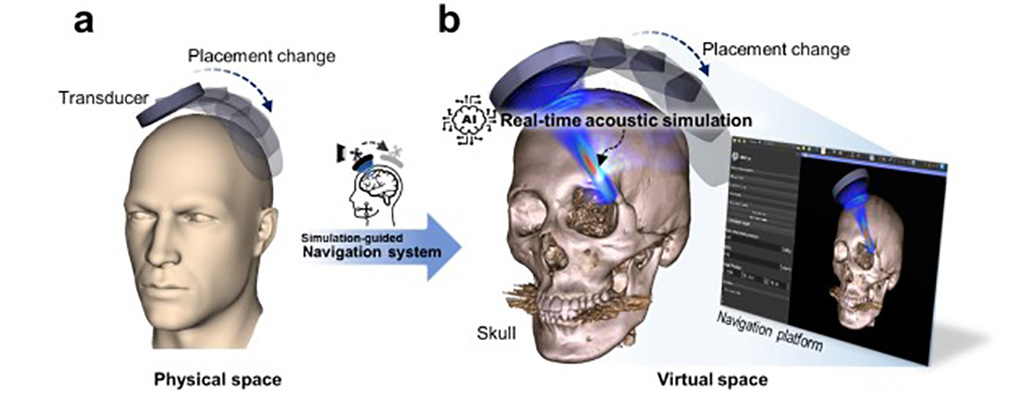AI to Improve Accuracy and Safety of Brain Disease Treatment with Focused Ultrasound
Posted on 28 Dec 2023
Focused ultrasound technology represents a groundbreaking, non-invasive approach to targeting and treating several millimeters of brain tissue, even in its deepest regions, without the need for surgical incisions. This method has shown promise in managing stubborn neurological conditions such as depression and Alzheimer's disease by minimizing damage to adjacent healthy tissue and reducing adverse effects like complications and infections. However, its wider adoption has been hindered by challenges in real-time adjustment for the ultrasound wave distortions caused by the unique contours of each patient's skull. Researchers have now made a significant breakthrough by creating a real-time acoustic simulation technology powered by generative AI, designed to predict and instantly correct any misalignment in the ultrasound focus due to skull distortion during therapy.
Currently, navigation systems based on pre-treatment medical images are used to estimate the invisible acoustic focus's position, which provides details of the relative orientation of the patient and the ultrasound transducer. Yet, these systems can falter as they cannot compensate for the skull-induced ultrasound wave distortions, and while various simulation methods have been tried to offset this limitation, they are typically too time-consuming for practical clinical use. Addressing this gap, a research team from the Korea Institute of Science and Technology (KIST, Seoul, South Korea) has innovated a real-time focused ultrasound simulation technology using a generative adversarial neural network (GAN), a deep learning model widely used for medical image generation. This AI-driven solution dramatically slashes the update time for three-dimensional simulation data reflecting changes in ultrasound waves from 14 seconds to a swift 0.1 seconds. Impressively, it maintains an average maximum acoustic pressure error under 7% and a focal position error below 6mm, both within the acceptable error margins of existing simulation methods, thereby enhancing its clinical viability.

Additionally, the researchers developed a medical image-based navigation system to validate the new technology's effectiveness, aiming for swift integration into actual clinical settings. This innovative system can provide real-time acoustic simulations at a rate of 5 Hz, depending on the ultrasound transducer's placement. It has successfully demonstrated real-time prediction of the ultrasound energy and focus points within the skull during therapy. Previously, due to extensive computation times, precise pre-planning was crucial for positioning the ultrasound transducer to utilize simulation insights effectively. However, with this cutting-edge simulation-guided navigation system, clinicians can now dynamically adjust the ultrasound focus in real-time, relying on the instant simulation feedback. Going forward, this advancement is poised to not only enhance the precision of focused ultrasound treatments but also to ensure safer patient care by rapidly adapting to any unforeseen issues arising during the procedure.
"As the accuracy and safety of focused ultrasound brain disease treatment has been improved through this research, more clinical applications will emerge," said KIST’s Dr. Kim, Hyungmin who led the research team. "For practical use, we plan to verify the system by diversifying the ultrasound sonication environment, such as multi-array ultrasound transducers."
Related Links:
KIST














